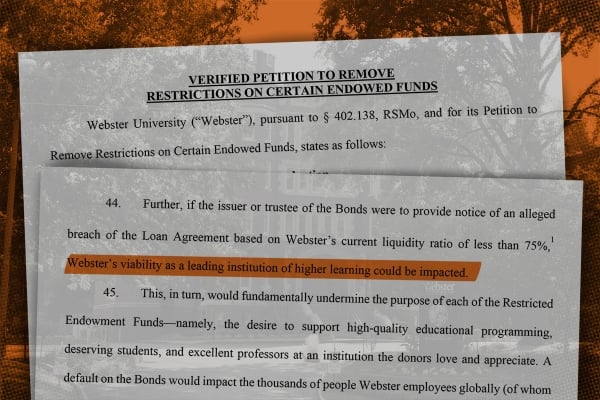#181 THE G|O BRIEFING, MAY 23, 2024
ILO Appoints Chinese Official Who Dismissed Concerns about Uyghurs | Webster Geneva Drops “University” Under Legal Pressure | Don't Believe the AI Hype | Trump, Israel, Hamas—Is Anyone Above the Law?
Today in The Geneva Observer:
A Former Chinese Official Dismissed the ILO’s Concerns about Discrimination of the Uyghurs—and the UN Labour Body just Appointed Her
Eyebrows have been raised at the ILO and among some of its Member States after the nomination of Xiaoyan Qian, a former senior Chinese official, as Director of the ILO Decent Work Technical Support Team for East and South-East Asia and the Pacific. Requesting anonymity, a source at the International Labour Organization described Ms. Qian’s nomination as “appalling” in light of her past statements denying the violation of human rights and discrimination against Uyghurs and other ethnic minorities, which have been alleged by the UN’s human rights body, the ILO’s independent Committee of Experts (CoE), and numerous human rights organizations.


In 2022, representing China during a discussion before the ILO’s Committee on the Application of Standards (CAS) about ILO Convention 111 on discrimination at work, Ms. Qian vigorously denied the Committee’s concerns and objected to the ILO’s oversight, according to the interpretation of her remarks: “Since 2020, China has supplied the Committee with numerous reports and elaborating facts, showing sincerity. This shows that we are a responsible member of this Organization. Regrettably, the Committee has adopted such a groundless position against China, asking China to stop the so-called and non-existing discriminative practices against Uyghur populations. We firmly reject such a practice. […] There exists no discrimination against any ethnicities. On China’s application of Convention No. 111, there are always a handful of anti-China forces who are manipulating this issue and criticizing using the Convention and this platform.”
Mrs. Qian represented Beijing’s government in her capacity as Deputy Director-General of the International Cooperation Department of the Chinese Ministry of Human Resources and Social Security (MOHRSS). At MOHRSS she worked under Mr. Hao Bin, who in 2023 was appointed ILO’s Assistant Director-General for Corporate Services.
While Mrs. Qian’s appointment to a technical position in the Bangkok bureau was the ILO D-G’s prerogative under the organization’s regulations, some ILO constituents and Member States are nevertheless expressing concerns: “Pulling someone directly from the Chinese government to oversee the ILO’s supervision and assistance in a region where, as in China, workers do not enjoy freedom of association, where unions are not authorized, is strange,” a diplomatic source familiar with the matter admitted to The G|O, referencing labour rights issues in Cambodia and Laos. “That kind of appointment does lead to some questions about the integrity of the ILO’s assistance in that sub-region and in the comfort that governments will have in assessing it. But the ILO is a large organization, and its norms and standards departments and other officials are heavily involved in the question,” the source added, expressing some hope that Ms. Qian’s positions may now defend the ILO's mission than her government's positions.
This controversial nomination comes on top of what informed, long-time ILO watchers consider a worrisome loss of institutional knowledge at the UN labour body. As a consequence of the D-G’s reorganization last year, many highly experienced specialists and managers have retired early or departed, and are no longer providing early warning signals about possible criticism of the organization when sensitive decisions are being considered. It runs deep, according to some sources. Recently, a senior ILO official had to apologize to a Member State’s representative for the sub-par quality of an important document emanating from senior management, one source outside the organization told me.
Requests from comments addressed to the ILO have remained unanswered.
-PHM
Under Legal Pressure from the Canton of Geneva, Webster Finally Rebrands
Webster University Geneva, a private higher education institution established in the city in 1978, has rebranded to Webster Geneva Campus. This change came after legal pressure from the Geneva Cantonal authorities, which engaged legal proceedings against Webster after its initial refusal to comply with new Swiss regulations and drop “university” from its name.
Ryan Guffey, Director of Webster Geneva Campus, confirmed to The Geneva Observer via email that “[t]he name change occurred earlier this year.” The institution’s rebranding follows a clampdown by Swiss authorities on the use of the term “university” by several private educational institutions, a situation first revealed by The Geneva Observer more than a year ago.

As of January 1, only private higher education institutions certified in Switzerland are permitted to use “university” in their names. While several institutions successfully obtained certification under the new law, Webster began the certification process but eventually withdrew its application. Sources close to the discussions between the Swiss Certification Board and Webster told The G|O at the time that compliance with the new requirements would have necessitated significant changes to Webster Geneva’s business model, impacting its revenue.
In the wake of this enforced name change, Webster Geneva is “assessing the broader implications of the new legislation across Switzerland,” Guffey emphasized in his email, adding that Webster “continues to be accredited by the US Higher Learning Commission.”
This rebranding occurs amid recent reports of serious financial and managerial difficulties faced by Webster University in the US.
-PHM

Related content:


Don’t Believe the AI Hype
MIT's economist Daron Acemoglu has another critical take on AI: “If you listen to tech industry leaders, business-sector forecasters, and much of the media, you may believe that recent advances in generative AI will soon bring extraordinary productivity benefits, revolutionizing life as we know it. Yet neither economic theory nor the data support such exuberant forecasts,” he writes.
According to tech leaders and many pundits and academics, artificial intelligence is poised to transform the world as we know it through unprecedented productivity gains. While some believe that machines soon will do everything humans can do, ushering in a new age of boundless prosperity, other predictions are at least more grounded. For example, Goldman Sachs predicts that generative AI will boost global GDP by 7% over the next decade, and the McKinsey Global Institute anticipates that the annual GDP growth rate could increase by 3-4 percentage points between now and 2040. For its part, The Economist expects that AI will create a blue-collar bonanza.
Is this realistic? As I note in a recent paper, the outlook is far more uncertain than most forecasts and guesstimates suggest. Still, while it is basically impossible to predict with any confidence what AI will do in 20 or 30 years, one can say something about the next decade, because most of these near-term economic effects must involve existing technologies and improvements to them.
It is reasonable to suppose that AI’s biggest impact will come from automating some tasks and making some workers in some occupations more productive. Economic theory provides some guidance for assessing these aggregate effects. According to Hulten’s theorem (named for economist Charles Hulten), aggregate “total factor productivity” (TFP) effects are simply the product of the share of tasks that are automated multiplied by the average cost savings.
While average cost savings are difficult to estimate and will vary by activity, there have already been some careful studies of AI’s effects on certain tasks. For example, Shakked Noy and Whitney Zhang have examined the impact of ChatGPT on simple writing tasks (such as summarizing documents or writing routine grant proposals or marketing material), while Erik Brynjolfsson, Danielle Li, and Lindsey Raymond have assessed the use of AI assistants in customer service. Taken together, this research suggests that currently available generative-AI tools yield average labor-cost savings of 27% and overall cost savings of 14.4%.
What about the share of tasks that will be affected by AI and related technologies? Using numbers from recent studies, I estimate this to be around 4.6%, implying that AI will increase TFP by only 0.66% over ten years, or by 0.06% annually. Of course, since AI will also drive an investment boom, the increase in GDP growth could be a little larger, perhaps in the 1-1.5% range.
"The tech industry is currently focused excessively on automation and monetizing data, rather than on introducing new production tasks for workers."
These figures are much smaller than the ones from Goldman Sachs and McKinsey. If you want to get those bigger numbers, you either must boost the productivity gains at the micro level or assume that many more tasks in the economy will be affected. But neither scenario seems plausible. Labor-cost savings far above 27% not only fall out of the range offered by existing studies; they also do not align with the observed effects of other, even more promising technologies. For example, industrial robots have transformed some manufacturing sectors, and they appear to have reduced labor costs by about 30%.
Similarly, we are unlikely to see far more than 4.6% of tasks being taken over, because AI is nowhere close to being able to perform most manual or social tasks (including seemingly simple functions with some social aspects, like accounting). As of 2019, a survey of essentially all US businesses found that only about 1.5% of them had any AI investments. Even if such investments have picked up over the past year and a half, we have a long, long way to go before AI becomes widespread.
Of course, AI could have larger effects than my analysis allows if it revolutionizes the process of scientific discovery or creates many new tasks and products. The recent AI-enabled discoveries of new crystal structures and advances in protein folding do suggest such possibilities. But these breakthroughs are unlikely to be a major source of economic growth within ten years. Even if new discoveries could be tested and turned into actual products much faster, the tech industry is currently focused excessively on automation and monetizing data, rather than on introducing new production tasks for workers.
Moreover, my own estimates could be too high. Early adoption of generative AI has naturally occurred where it performs reasonably well, meaning tasks for which there are objective measures of success, such as writing simple programming subroutines or verifying information. Here, the model can learn on the basis of outside information and readily available historical data.
But many of the 4.6% of tasks that could feasibly be automated within ten years – evaluating applications, diagnosing health problems, providing financial advice – do not have such clearly defined objective measures of success, and often involve complex context-dependent variables (what is good for one patient will not be right for another). In these cases, learning from outside observation is much harder, and generative AI models must rely instead on the behavior of existing workers.
"There is little to support the argument that we should not worry about regulation, because AI will be the proverbial rising tide that lifts all boats."
Under these circumstances, there will be less room for major improvements over human labor. Thus, I estimate that about one-quarter of the 4.6% tasks are of the “harder-to-learn” category and will have lower productivity gains. Once this adjustment is made, the 0.66% TFP growth figure declines to about 0.53%.
What about the effects on workers, wages, and inequality? The good news is that, compared to earlier waves of automation – such as those based on robots or software systems – the effects of AI may be more broadly distributed across demographic groups. If so, it will not have as extensive an impact on inequality as earlier automation technologies did (I estimated these effects in my previous work with Pascual Restrepo). However, I find no evidence that AI will reduce inequality or boost wage growth. Some groups – especially white, native-born women – are significantly more exposed and will be negatively affected, and capital will gain more than labor overall.
Economic theory and the available data justify a more modest, realistic outlook for AI. There is little to support the argument that we should not worry about regulation, because AI will be the proverbial rising tide that lifts all boats. AI is what economists call a general-purpose technology. We can do many things with it, and there are certainly better things to do than automate work and boost the profitability of digital advertising. But if we embrace techno-optimism uncritically or let the tech industry set the agenda, much of the potential could be squandered.
Daron Acemoglu, Institute Professor of Economics at MIT, is a co-author (with Simon Johnson) of Power and Progress: Our Thousand-Year Struggle Over Technology and Prosperity (PublicAffairs, 2023).
Who’s Above the Law?
“No one,” the US claims loudly, as its former president sits on trial in New York. “Indeed,” concurs Kharim Khan, the International Criminal Court’s Chief Prosecutor, in requesting arrest warrants for Israeli and Hamas leaders. In which case, wonders Daniel Warner in his op-ed, why does Washington object?
Trump May Not Be Above the Law, but Are Israeli and Hamas Leaders?
While statements that “No one is above the law,” are repeated in the US over the trials of former President Donald Trump, can the same be said when it comes to international law? Chief Prosecutor Karim Khan of the International Criminal Court (ICC) answered yes, by analogy, when he announced he was seeking arrest warrants for Hamas leader Yahya Sinwar and Israeli Prime Minister Benjamin Netanyahu on charges of war crimes and crimes against humanity.
Leaders of both Israel and Hamas are being held accountable for their drive for battlefield victory outside internationally accepted laws of war. After Israeli Prime Minister Benjamin Netanyahu met with US officials in December 2023, he said in a video statement, “I told our American friends: Our heroic soldiers have not fallen in vain. Out of the deep pain of their having fallen, we are more determined than ever to continue fighting until Hamas is eliminated—until absolute victory.” Netanyahu’s goal; not just victory, but “absolute victory,” no matter the cost. On February 25, 2024, Netanyahu told US television: “Once we begin the Rafah operation, the intense phase of the fighting is weeks away from completion, not months.” “If we don’t have a deal,” he told CBS, “we’ll do it anyway. It has to be done because total victory is our goal and total victory is within reach.”
In announcing the request for arrest warrants to CNN’s Christiane Amanpour, Khan said that he made a distinction between the crimes committed by Hamas and Israeli leaders: “The charges against Netanyahu and [Israeli Defense Secretary Yoav] Gallant include ‘causing extermination, causing starvation as a method of war, including the denial of humanitarian relief supplies, deliberately targeting civilians in conflict.’” Netanyahu’s actions in pursuit of “total” or “absolute victory” are, according to the ICC’s chief prosecutor, in flagrant violation of international humanitarian law.
As for Hamas, Khan said he believes Hamas leaders Yahya Sinwar, Mohammed Deif and Ismail Haniyeh are responsible for war crimes and crimes against humanity in the Gaza Strip and Israel. In his statement about Hamas, Khan wrote: “It is the view of my Office that these individuals planned and instigated the commission of crimes on 7 October 2023, and have through their own actions, including personal visits to hostages shortly after their kidnapping, acknowledged their responsibility for those crimes.”
Hamas responded to Khan in a statement that it “strongly condemns the attempts of the ICC Prosecutor to equate victims with aggressors by issuing arrest warrants against a number of Palestinian resistance leaders without legal basis.” “Hamas calls on the ICC Prosecutor to issue arrest warrants against all war criminals among the occupation leaders, officers, and soldiers who participated in crimes against the Palestinian people, and demands the cancellation of all arrest warrants issued against Palestinian resistance leaders,” they added.
External international legal experts who assisted the ICC in examining the evidence confirmed Khan’s findings against Israel and Hamas, writing in their published report: “we unanimously agree that the prosecutor’s work was rigorous, fair and grounded in the law and facts. And we unanimously agree that there are reasonable grounds to believe that the suspects he identified have committed war crimes and crimes against humanity within the jurisdiction of the ICC.”
While the answer within the United States about Trump’s being above the law remains to be seen—the potential is there for Trump to claim immunity or pardon himself in the event that he is found guilty and then re-elected—the international answer by analogy is even more problematic. The ICC has no police force; states who have signed the Rome statutes (there are 124) are supposed to arrest fugitives. The ICC cannot try defendants in absentia.
Moreover, Israel and the United States, neither of which has signed the Rome statutes, have strongly rejected Khan’s position, if not the legitimacy of the ICC itself. Prime Minister Netanyahu said that the country “will never accept any attempt by the ICC to undermine its inherent right of self-defense.” President Biden, cherrypicking his attitude to the ICC having previously praised its March 2023 warrant for President Putin, termed the prosecutor’s demand for arrest warrants against Israel “outrageous”—ironically choosing the very word used by the Kremlin to denounce the Court’s 2023 decision.
Under President Trump, in 2020, the US went so far as to authorize economic sanctions against ICC officials investigating or prosecuting US personnel for alleged war crimes in Afghanistan. Sanctions against the ICC are once more being discussed in Congress and have been hinted at by Antony Blinken.
Khan has given his answer to the tension between national subjectivity and international objectivity: “Nobody is above the law,” he stated clearly. His demand for warrants strongly counters a typical American position, expressed by President Trump before the UN General Assembly in 2018: “We reject the ideology of globalism, and we embrace the doctrine of patriotism. Around the world, responsible nations must defend against threats to sovereignty…”
The international system, however, is inherently different from the domestic one. There is no international sovereignty. We duly note the German sociologist Max Weber’s classic definition of a state as a “human community that (successfully) claims the monopoly of the legitimate use of physical force within a given territory.” The international system has no such monopoly on the legitimate use of physical force on a global scale.
What makes the ICC chief prosecutor’s request for warrants unique in the tension between state sovereignty and international law, according to law professor David Kaye, is that it is “the first time the court has targeted a Western democracy with a vibrant court system or the top leaders of a close US ally.”
Karim Khan has taken on an enormous challenge. His very request for warrants has caused an enormous stir. If he is successful in having them issued, his victory will be a victory for objectivity over subjectivity, and a victory far removed from any win on a battlefield. It will be a profound victory for justice.
-DW
Today's Briefing: Philippe Mottaz
Guest Essay: Daron Acemoglu
Op-ed: Daniel Warner
Editorial assistance and research : David Jenny
Edited by: Dan Wheeler
© The Geneva Observer 2024 and Project Syndicate - All rights reserved





